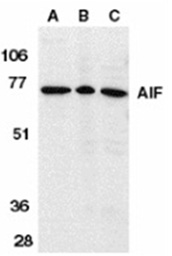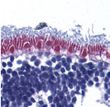AIF (AIFM1) (517-531) Rabbit Polyclonal Antibody
Other products for "AIFM1"
Specifications
| Product Data | |
| Applications | IHC, WB |
| Recommended Dilution | Western Blot: 0.25-1 µg/ml. Immunohistochemistry on Paraffin Sections: 10 µg/ml; this product requires antigen retrieval using heat treatment prior to staining of paraffin sections; Sodium citrate buffer pH6.0 is recommended for this purpose. |
| Reactivities | Human, Mouse, Rat |
| Host | Rabbit |
| Clonality | Polyclonal |
| Immunogen | Peptide corresponding to amino acids 517 - 531 of human AIF |
| Specificity | This antibody recognises Apoptosis Inducing Factor (AIF). The antibody reacts with an internal region of AIF. |
| Formulation | PBS containing 0.02% Sodium Azide as preservative. State: Purified State: Liquid purified IgG fraction. |
| Concentration | lot specific |
| Purification | Ion Exchange Chromatography. |
| Conjugation | Unconjugated |
| Storage | Store the antibody undiluted at 2-8°C for one month or (in aliquots) at -20°C for longer. Avoid repeated freezing and thawing. |
| Stability | Shelf life: one year from despatch. |
| Gene Name | apoptosis inducing factor, mitochondria associated 1 |
| Database Link | |
| Background | Apoptosis is characterized by several morphological nuclear changes including chromatin condensation and nuclear fragmentation. These changes are triggered by the activation of members of caspase family, caspase activated DNase, and several novel proteins. A novel gene, the product of which causes chromatin condensation and DNA fragmentation, was recently identified, cloned, and designated apoptosis inducing factor (AIF). Like the critical molecules, cytochrome c and caspase-9, in apoptosis, AIF localizes in mitochondria. AIF translocates to the nucleus when apoptosis is induced and induces mitochondria to release the apoptogenic proteins cytochrome c and caspase-9. AIF induces chromatin condensation and large scale DNA fragmentation, which are the hallmarks of apoptosis, of the isolated nucleus and the nucleus in live cells by microinjection and apoptosis stimuli. AIF is highly conserved between human and mouse and widely expressed. |
| Synonyms | PDCD8 |
| Reference Data | |
Documents
| Product Manuals |
| FAQs |
| SDS |
{0} Product Review(s)
0 Product Review(s)
Submit review
Be the first one to submit a review
Product Citations
*Delivery time may vary from web posted schedule. Occasional delays may occur due to unforeseen
complexities in the preparation of your product. International customers may expect an additional 1-2 weeks
in shipping.






























































































































































































































































 Germany
Germany
 Japan
Japan
 United Kingdom
United Kingdom
 China
China




